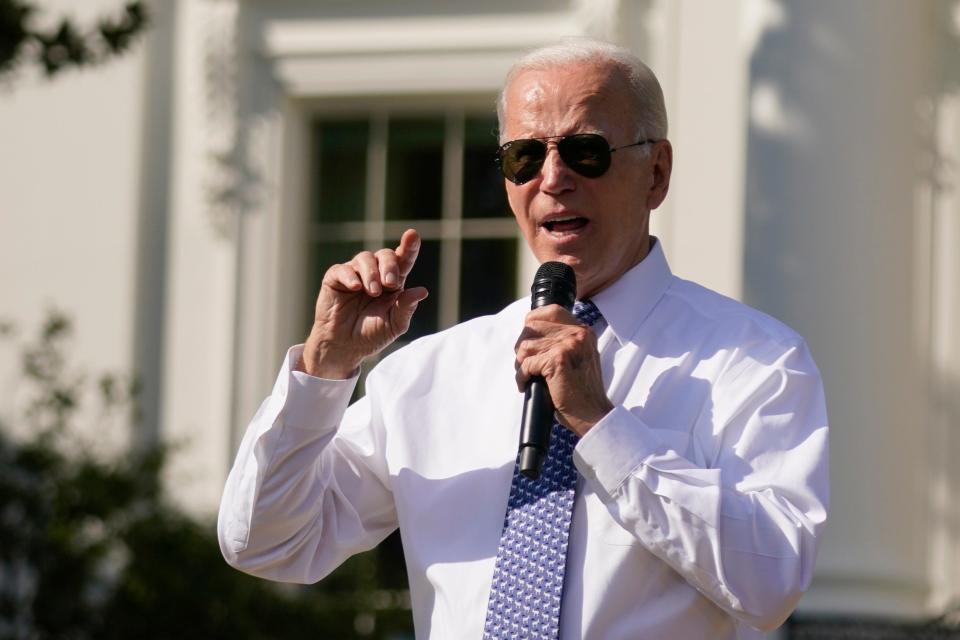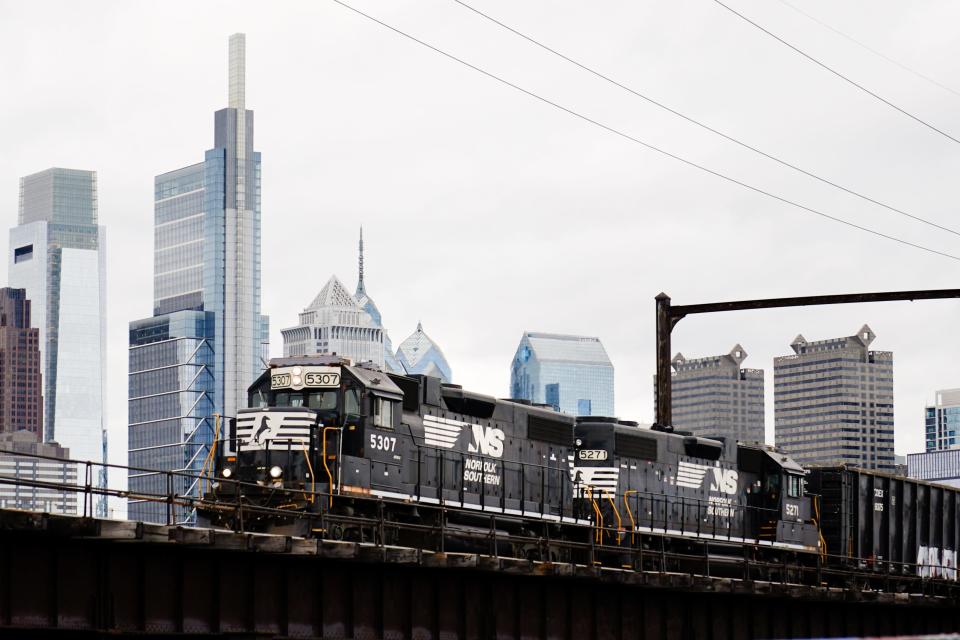Pressure mounts on Biden to avert freight rail strike as union deadline looms
WASHINGTON – President Joe Biden faces a narrowing window to avert a strike from freight railroad workers that could further strain supply chains and deliver a damaging blow to Democrats before the midterm elections.
Top aides and Biden himself were in touch with railroad companies and union representatives late into Monday evening and Tuesday to try to avoid a shutdown.
The White House is exploring contingencies including invoking emergency authorities to ensure crucial materials are still delivered if there is a shutdown, according to a White House official, who discussed the talks on the condition of anonymity.
Workers and the rail carriers have until Friday to reach an agreement. That's when a federally mandated "cooling off" period ends, which would open the door for about 115,000 rail workers in unions to walk off the job.
Inside the rail dispute
Three years of talks: Negotiations for a new contract between the nation's six largest freight carriers – Union Pacific, CSX, Norfolk Southern, BNSF, Canadian National and Kansas City Southern – and 12 unions go back nearly three years. Biden appointed a Presidential Emergency Board in July to mediate the dispute.
Areas of agreement: A trade organization representing the companies has announced agreements with eight of the unions that closely match recommendations of Biden's emergency board, including wage increases of 24%, bonuses totaling $5,000 and one additional paid-leave day a year.
Unresolved issues: The two largest unions representing conductors and engineers have not signed on to the proposal, citing a lack of measures to address working conditions and strict attendance policies. The groups' leaders say their members have been terminated for getting sick or missing work for medical visits.
"Economic disaster": A national strike from railroad workers could jeopardize the shipment of retail products, critical goods and raw materials while inflation is already high, a scenario the U.S. Chamber of Commerce said would be an "economic disaster."

What happens next as railroad strike looms
Labor Secretary Marty Walsh is meeting Wednesday with union leaders and carrier executives in Washington to work on a deal.
The White House called a shutdown "not acceptable" and is working on contingency plans in case an agreement is not reached. That includes conversations with the trucking and air freight industries about filling the void to keep goods moving.
The administration has also discussed whether invoking presidential emergency powers is an option to ensure food, energy and other essential products are delivered to customers during a shutdown, according to a White House official.
The Association of American Railroads is pushing Congress to intervene under the Railway Labor Act to block a shutdown by approving legislation that would implement the Presidential Emergency's Board's recommendations. The association estimated a nationwide rail strike could reduce economic output by more than $2 billion a day.
Con: Looming railroad strike could be 'economic disaster,' impacting consumers from all angles
Sens. Richard Burr, R-N.C., and Roger Wicker, R-Miss., introduced legislation Monday that would adopt the recommendations if an agreement is not reached.
To prepare for a possible shutdown, the railroad companies said they plan to curtail the shipment of hazardous materials and crucial goods so containers aren't stranded along tracks. Union leaders slammed the move as "corporate terrorism" and "scare tactics" designed to get Congress to cave.

Takeaways
Biden is stuck in a hard spot politically as an outspoken supporter of unions while desperately wanting to avoid the repercussions of a shutdown.
More than any other modern president, Biden regularly hails organized labor. He said last year that his goal is to be "the most pro-union president leading the most pro-union administration in American history."
More: Asset or liability? Biden's momentum hasn't led to new invitations on midterm campaign trail
But a strike and bottlenecked supply chains could undermine Democrats' credibility on the economy, giving Republicans new ammunition as they look to regain control of Congress in the November elections.
Such a setback could halt Biden's recent momentum. The president is experiencing a bounce in approval ratings after a series of legislative wins in Congress and declining gas prices. And Democrats have been energized by the Supreme Court's decision to overturn Roe v. Wade, reversing their once-gloomy prospects to maintain control of Congress.
What they are saying about the railroad labor standoff
White House press secretary Karine Jean-Pierre said Tuesday that the president continues to urge the railroads and unions to "stick at the negotiation table" to reach an agreement. "A shutdown is not acceptable," she said. "It risks harming families; it risks harming businesses and whole communities."
Ian Jefferies, president and CEO of the Association of American Railroads, said a work stoppage would result in an "unnecessary $2 billion daily economic hit" just as the freight sector moves into peak shipping season. The railroad companies he represents have accused the uncommitted unions of taking positions "expressly rejected" by the Presidential Emergency Board.
Jeremy Ferguson and Dennis Pierce, presidents of the unions representing conductors and engineers, stuck to their demands in a joint statement. "Rather than gridlock the supply chain by denying shipments and potentially locking our members out Friday, the railroads should work towards a fair settlement that our members, their employees, would ratify."
Burr, ranking member of the Senate Health, Education, Labor and Pensions Committee, said a railroad strike would be "catastrophic" for America's freight system and supply chains. "The Biden administration should reject labor unions’ bullying tactics."
“A national rail strike would be an economic disaster – freezing the flow of goods, emptying shelves, shuttering workplaces and raising prices for families and businesses alike," said Suzanne Clark, president and CEO of the U.S. Chamber of Commerce, which has asked Congress to intervene if the stalemate continues. "But that is exactly what is likely to happen in less than four days."
The big picture
The economy and soaring consumer prices remain Biden’s biggest vulnerability.
Even though gas prices declined for the second straight month in September, overall inflation hasn’t decreased as fast as many experts forecast.
Overall prices increased 8.3% from a year earlier, down from an 8.5% rise in July and a 40-year high of 9.1% in June. But many economists had predicted yearly inflation would fall to 8%.
Less than 60 days before the midterm elections, the last thing Democrats need is more economic uncertainty as a result of a freight rail shutdown.
More: Is Biden responsible for dip in inflation? President's victory lap is premature, experts say
Reach Joey Garrison on Twitter @joeygarrison.
This article originally appeared on USA TODAY: As railroad strike looms, Biden faces pressure: latest on labor talks

